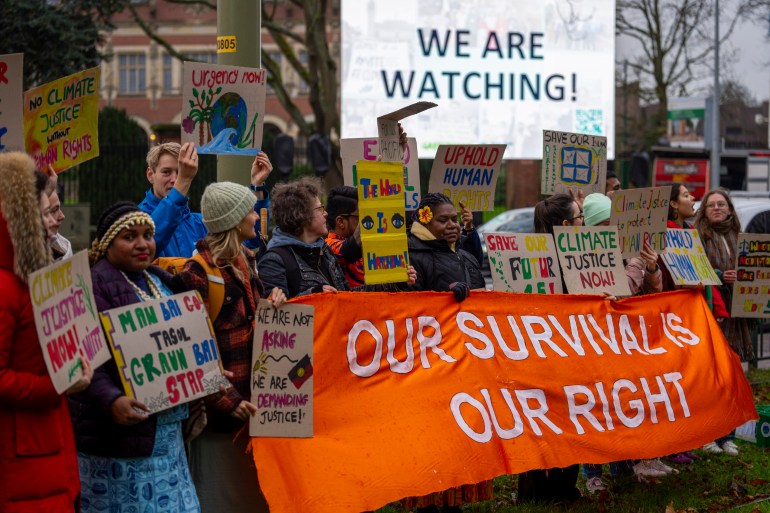Historic hearings at the International Court of Justice (ICJ) in The Hague have drawn to a close after more than 100 countries and international organisations presented arguments over two weeks on who should bear legal responsibility for the worsening climate crisis.
Spearheading the effort was Vanuatu which, alongside other Pacific island nations, says the climate crisis poses a threat to its very existence.
“It is with a profound sense of urgency and responsibility that I stand before you today,” Ralph Regenvanu, Vanuatu’s special envoy for climate change and environment, said as he opened the hearings on December 2.
“The outcome of these proceedings will reverberate across generations, determining the fate of nations like mine and the future of our planet,” he said.
In the two weeks that followed, dozens of countries made similar entreaties, while a handful of major fossil fuel-producing countries argued polluters should not be held responsible.
Sebastien Duyck, a senior lawyer with the Center for International Environmental Law (CIEL), which monitored the hearings, said the countries arguing against legal liability were in the minority.
“Major polluters, including the United States, United Kingdom, Russia, China, Germany, Saudi Arabia, Canada, Australia, Norway, and Kuwait, found themselves isolated in their attempts to play the legal system to serve their self-interests and insulate themselves from accountability,” Duyck said in a statement.
“It is time to break this cycle of harm and impunity,” he added.
The ICJ’s 15 judges from around the world must now consider two questions: what are countries obliged to do under international law to protect the climate and environment from human-caused greenhouse gas emissions?
And what are the legal consequences for governments when their acts, or lack of action, have significantly harmed the climate and environment?

Among countries that provided oral statements during the hearings was the State of Palestine, which joined other developing nations in calling for international law to “take centre stage in protecting humanity from the dangerous path of human-made destruction resulting from climate change”.
The Palestinian statement also offered insights into the ways that Israel’s illegal occupation is both causing climate change and hurting Palestinians’ ability to respond to it.
“There can be no doubt that the ongoing illegal Israeli belligerent occupation of Palestine and its discriminatory policies have clear negative climate effects,” Ammar Hijazi, the State of Palestine’s ambassador to the Netherlands, said on Monday.
East Timor, also known as Timor-Leste, testified in support of Vanuatu’s case.
“The climate crisis that we face today is the result of the historical and ongoing actions of industrialised nations, which have reaped the benefits of rapid economic growth, powered by colonial exploitation and carbon-intensive industries and practices,” Elizabeth Exposto, chief of staff to Timor-Leste’s prime minister, said on Thursday.
“These nations, representing only a fraction of the global population, are overwhelmingly responsible for the climate crisis,” she added, “and yet, the impacts of climate change do not respect borders.”
The hearings come after 132 countries at the United Nations General Assembly voted in March 2023 to support Vanuatu’s push for an opinion from the ICJ on the legal obligations nations are under to protect current and future generations from climate change.
The turn to courts to spur action on climate change also reflects a growing degree of dissatisfaction among some governments at the lack of progress in UN climate negotiations, where decisions are based on consensus.
The most recent COP29 summit in Baku, Azerbaijan, concluded with rich countries pledging to contribute $300bn a year by 2035 to help poorer nations combat the effects of climate change.
But the Climate Action Network International, a network of 1,900 civil society groups in more than 130 countries, described the deal as a “joke”, when compared with the costs developing countries are facing as climate change worsens.
As Regenvanu noted in his statement for Vanuatu, “it is unconscionable that the COP failed to reach any agreement on cutting emissions”.
“There is an urgent need for a collective response to climate change grounded not in political convenience but in international law.”
WATCH LIVE: Vanuatu and the Melanesian Spearhead Group (jointly), South Africa, Albania and Germany open
the public hearings in the advisory proceedings on Obligations of States in respect of Climate Changehttps://t.co/qGazks5diA— CIJ_ICJ (@CIJ_ICJ) December 2, 2024
